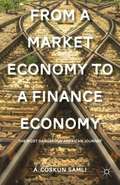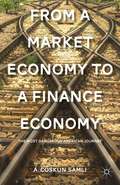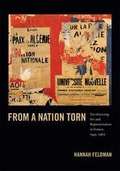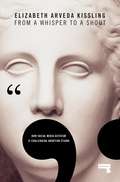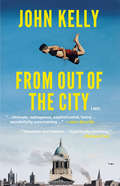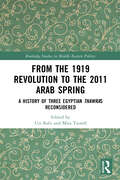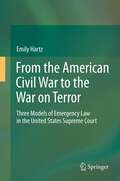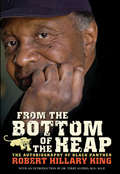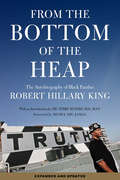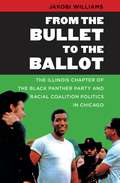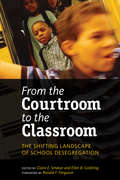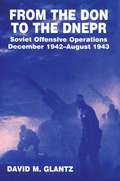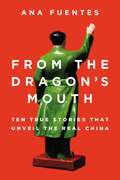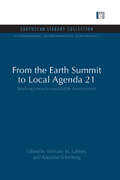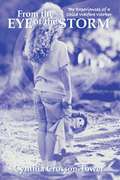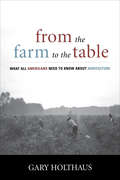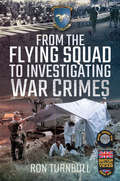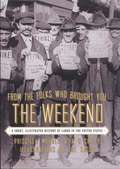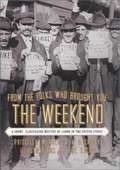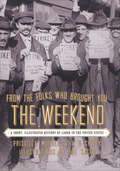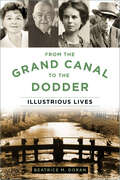- Table View
- List View
From a Market Economy to a Finance Economy
by A. Coskun SamliIn this gripping book, Dr. Samli makes the case that the US economy is shifting for the worse, tilting towards a finance-driven economy, and argues that investing in innovation will bring us out of the recession and back to a successful, market-driven economy.
From a Market Economy to a Finance Economy: The Most Dangerous American Journey
by A. SamliIn this gripping book, Dr. Samli makes the case that the US economy is shifting for the worse, tilting towards a finance-driven economy, and argues that investing in innovation will bring us out of the recession and back to a successful, market-driven economy.
From a Nation Torn: Decolonizing Art and Representation in France, 1945-1962
by Hannah FeldmanFrom a Nation Torn provides a powerful critique of art history's understanding of French modernism and the historical circumstances that shaped its production and reception. Within art history, the aesthetic practices and theories that emerged in France from the late 1940s into the 1960s are demarcated as postwar. Yet it was during these very decades that France fought a protracted series of wars to maintain its far-flung colonial empire. Given that French modernism was created during, rather than after, war, Hannah Feldman argues that its interpretation must incorporate the tumultuous "decades of decolonization"and their profound influence on visual and public culture. Focusing on the Algerian War of Independence (1954-1962) and the historical continuities it presented with the experience of the Second World War, Feldman highlights decolonization's formative effects on art and related theories of representation, both political and aesthetic. Ultimately, From a Nation Torn constitutes a profound exploration of how certain populations and events are rendered invisible and their omission naturalized within histories of modernity.
From a Small Seed - The Story of Eliza Hamilton
by Camille AndrosA lyrical picture book biography of Eliza Schuyler Hamilton, co-founder and director of the first private orphanage in New York City and wife of founding father Alexander Hamilton.Ever since she was a young girl, Eliza Hamilton hoped to help people in need. From the private quarters of her family home to her national platform as Hamilton’s partner, Eliza was a lifelong advocate for fairness, freedom and faith. The remarkable acts of charity and public service she performed after Alexander’s death are considered a significant contribution to the Hamilton legacy the world celebrates today. Here is a thoughtful, historical account of her life beginning with her childhood influences.Much like the award-winning picture book biographies that celebrate trailblazing women like The House that Jane Built: A Story About Jane Addams and Hillary Rodham Clinton: Some Girls Are Born to Lead, Camille Andros and Tessa Blackham's From a Small Seed—The Story of Eliza Hamilton is an accessible portrait of an exemplary public figure whose principles have stood the test of time. Christy Ottaviano Books
From a Whisper to a Shout: How Social Media Activism Is Challenging Abortion Stigma
by Elizabeth KisslingAbortion remains legal in the US, but access has been slowly eroded since prohibition was ruled unconstitutional nearly fifty years ago. Simultaneously abortion remains culturally stigmatised – it is kept secret and presumed shameful. But feminist activists are working to increase access and challenge this stigma. Numerous organisations and campaigns are challenging abortion stigma using the internet and social media and intersectional feminist sensibilities. From A Whisper to a Shout takes a closer look at four of these organisations – #ShoutYourAbortion, Lady Parts Justice, #WeTestify, and The Abortion Diary – and how they are integrating feminist tactics, social media, and political strategies to challenge abortion stigma and promote abortion access.
From out of the City
by John KellyThis intriguing novel brings us to a future in which electricity is scarce and Dublin has gone to seed. Hawk-eyed octogenarian Monk is keeping assorted desperate characters under strict surveillance -- among them Schroeder, recently sacked from Trinity College, now stalking a reporter in the days leading up to the visit of the U. S. President. When the unthinkable happens and the President is assassinated, Monk sets about discovering what's happened to those in his care and, along the way, to the late President -- but this is not, he insists, the story of an assassination. Nor is it a thriller. It's the truth.
From the 1919 Revolution to the 2011 Arab Spring: A History of Three Egyptian Thawras Reconsidered (Routledge Studies in Middle Eastern Politics)
by Uzi Rabi Mira TzoreffFocused on three Egyptian revolutions—in 1919, 1952, and 2011—this edited book argues that each of these revolutions is a milestone which represents a meaningful turning point in modern Egyptian history.Revolutions are typically characterized by a fundamental change in political and social infrastructures as well as in the establishment of new values and norms. However, it should be noted that this may not be entirely applicable when examining the context of the three Egyptian revolutions: the 1919 revolution failed to liberate Egypt from British colonial hegemony; the 1952 revolution failed to rework the country’s social and economic systems and unify the Arab world; and the "Arab Spring" revolution of 2011 culminated in a chaotic economic and social catastrophe, thus failing to solve the young generation’s crisis. Nevertheless, by revisiting and re-defining these revolutions through diverse theoretical frameworks, the book proposes that each of them played a significant role in shaping Egypt’s political, social, and cultural identity.This book is specifically of interest for students, historians, and social scientists with a keen interest in Egyptian history and the Middle East, offering fresh perspectives and insights into these transformative moments in Egypt’s history.
From the American Civil War to the War on Terror
by Emily HartzThis book offers a systematic and comprehensive account of the key cases that have come to shape the jurisprudence on emergency law in the United States from the Civil War to the War on Terror. The legal questions raised in these cases concern fundamental constitutional issues such as the status of fundamental rights, the role of the court in times of war, and the question of how to interpret constitutional limitations to executive power. At stake in these difficult legal questions is the issue of how to conceive of the very status of law in liberal democratic states. The questions with which the Supreme Court justices have to grapple in these cases are therefore as philosophical as they are legal. In this book the Court's arguments are systematized according to categories informed by constitutional law as well as classic philosophical discussions of the problem of emergency. On this basis, the book singles out three legal paradigms for interpreting the problem of emergency: the rights model, the extra-legal model and the procedural model. This systematic approach helps the reader develop a philosophical and legal overview of central issues in the jurisprudence on emergency.
From the Ashes
by Jeremy BurnsA DEADLY CONSPIRACYGraduate students Jonathan and Michael Rickner, sons of eminent archaeologist Sir William Rickner, are no strangers to historical mysteries and archaeological adventures. But when Michael is discovered dead in his Washington, D.C. apartment, Jon refuses to believe the official ruling of suicide. Digging deeper into his brother's work, he discovers evidence that Michael was murdered to keep his dissertation research buried.A DEVASTATING NATIONAL SECRETJoined by Michael's fiancée Mara Ellison, Jon travels to New York where he uncovers the threads of a deadly Depression-era conspiracy - one entangling the Hoover Administration, the Rockefellers, and the rise of Nazi Germany - and the elite cadre of assassins that still guard its unspeakable secret.THE LABYRINTHINE PATH TO THE TRUTHFinding themselves in the crosshairs of the same men who killed Michael, Jon and Mara must navigate a complex web of historical cover-ups and modern-day subterfuge, outwitting and outrunning their all-powerful pursuers as they race through the monuments and museums of Manhattan in a labyrinthine treasure hunt to discover the last secret of John D. Rockefeller, Jr., before their enemies can bury the truth - and them - forever.
From the Bottom of the Heap: The Autobiography of Black Panther Robert Hillary King (PM Press)
by Robert Hillary KingIn 1970, a jury convicted Robert Hillary King of a crime he did not commit and sentenced him to 35 years in prison. He became a member of the Black Panther Party while in Angola State Penitentiary, successfully organizing prisoners to improve conditions. In return, prison authorities beat him, starved him, and gave him life without parole after framing him for a second crime. He was thrown into solitary confinement, where he remained in a six by nine foot cell for 29 years as one of the Angola 3. In 2001, the state grudgingly acknowledged his innocence and set him free. This is his story.It begins at the beginning: born black, born poor, born in Louisiana in1942, King journeyed to Chicago as a hobo at the age of 15. He married and had a child, and briefly pursued a semi-pro boxing career to help provide for his family. Just a teenager when he entered the Louisiana penal system for the first time, King tells of his attempts to break out of this system, and his persistent pursuit of justice where there is none.Yet this remains a story of inspiration and courage, and the triumph of the human spirit. The conditions in Angola almost defy description, yet King never gave up his humanity, or the work towards justice for all prisoners that he continues to do today. From the Bottom of the Heap, so simply and humbly told, strips bare the economic and social injustices inherent in our society, while continuing to be a powerful literary testimony to our own strength and capacity to overcome.
From the Bottom of the Heap: The Autobiography of Black Panther Robert Hillary King (Pm Press Ser.)
by Mumia Abu-Jamal Robert Hillary King Terry KupersExpanded and updated with new photographs and stories, this autobiography of one of the Angola Three traces the life of Robert Hillary King from his early days in Louisiana, through a troubled adolescence, a conviction that kept him behind bars for decades, his relationship with the Black Panther Party, and his eventual release from prison. In 1970, a jury convicted Robert Hillary King of a crime he did not commit and sentenced him to 35 years in prison. He became a member of the Black Panther Party while in Angola State Penitentiary, successfully organizing prisoners to improve conditions. In return, prison authorities beat him, starved him, and gave him life without parole after framing him for a second crime. He was thrown into solitary confinement, where he remained for 29 years. In 2001, the state grudgingly acknowledged his innocence and set him free. A story of inspiration and courage, this simple and humble narrative strips bare the economic and social injustices inherent in society, while proving to be a powerful literary testimony to the triumph of the human spirit.
From the Bullet to the Ballot
by Jakobi WilliamsIn this comprehensive history of the Illinois Chapter of the Black Panther Party (ILBPP), Chicago native Jakobi Williams demonstrates that the city's Black Power movement was both a response to and an extension of the city's civil rights movement. Williams focuses on the life and violent death of Fred Hampton, a charismatic leader who served as president of the NAACP Youth Council and continued to pursue a civil rights agenda when he became chairman of the revolutionary Chicago-based Black Panther Party. Framing the story of Hampton and the ILBPP as a social and political history and using, for the first time, sealed secret police files in Chicago and interviews conducted with often reticent former members of the ILBPP, Williams explores how Hampton helped develop racial coalitions between the ILBPP and other local activists and organizations.Williams also recounts the history of the original Rainbow Coalition, created in response to Richard J. Daley's Democratic machine, to show how the Panthers worked to create an antiracist, anticlass coalition to fight urban renewal, political corruption, and police brutality.
From the Corner of the Oval: A Memoir
by Beck Dorey-SteinThe compulsively readable, behind-the-scenes memoir that takes readers inside the Obama White House, through the eyes of a young staffer learning the ropes, falling in love, and finding her place in the world. <P><P>In 2012, Beck Dorey-Stein is working five part-time jobs and just scraping by when a posting on Craigslist lands her, improbably, in the Oval Office as one of Barack Obama’s stenographers. The ultimate D.C. outsider, she joins the elite team who accompany the president wherever he goes, recorder and mic in hand. <P><P>On whirlwind trips across time zones, Beck forges friendships with a dynamic group of fellow travelers—young men and women who, like her, leave their real lives behind to hop aboard Air Force One in service of the president. <P><P>As she learns to navigate White House protocols and more than once runs afoul of the hierarchy, Beck becomes romantically entangled with a consummate D.C. insider, and suddenly the political becomes all too personal. <P><P>Against the backdrop of glamour, drama, and intrigue, this is the story of a young woman making unlikely friendships, getting her heart broken, learning what truly matters, and, in the process, discovering her voice. <P><b>A New York Times Bestseller</b>
From the Courtroom to the Classroom: The Shifting Landscape of School Desegregation
by Claire E. Smrekar Ronald F. Ferguson Ellen B. GoldringFrom the Courtroom to the Classroom examines recent developments pertaining to school desegregation in the United States. As the editors note, it comes at a time marked by a "general downplaying of race and ethnicity as criteria for the allocation of public resources, as well as a weakening of the political forces that support busing to achieve racial integration." The book fills a growing need for a full-scale assessment of this recent history and its effect on schools, children, and communities.
From the Courtroom to the Classroom: The Shifting Landscape of School Desegregation
by Claire Smrekar and Ellen GoldringFrom the Courtroom to the Classroom examines recent developments pertaining to school desegregation in the United States. As the editors note, it comes at a time marked by a &“general downplaying of race and ethnicity as criteria for the allocation of public resources, as well as a weakening of the political forces that support busing to achieve racial integration.&” The book fills a growing need for a full-scale assessment of this recent history and its effect on schools, children, and communities.
From the Don to the Dnepr: Soviet Offensive Operations, December 1942 - August 1943 (Soviet (Russian) Military Experience #Vol. 1)
by David M. GlantzThis book provides an in-depth study of the Soviet Army during the offensive operations that started with Battle of Stalingrad in December 1942 and went until Spring 1943. The lessons learned by the Soviet Army from these experiences helped design the military steamroller that decimated the German panzer divisions at Kursk in the Summer of 1943.
From the Dragon's Mouth
by Ana FuentesWHO ARE THE CHINESE? Through on-the-ground interviews, Ana Fuentes uncovers the real China and offers a panoramic look at Chinese culture from the point of view of its citizens. She spent nearly 4 years living and working in China and discovered a world few have written about . . . until now. FROM THE DRAGON'S MOUTH: Ten True Stories that Unveil the Real China is an exquisitely intimate look into the China of the 21st century as seen through the eyes of its people. This is the first time that a book combines the voices of everyday Chinese people from so many different layers of society: a dissident tortured by the police; a young millionaire devoted to nationalism; a peasant-turnedprostitute to pay for the best education for her son; a woman who married her gay friend to escape from social pressure, just like an estimated 16 million other women; a venerable Kung-Fu master unable to train outdoors because of the hazardous pollution; the daughter of two Communist Party officials getting rich coaching Chinese entrepreneurs in the ways of Capitalism; among others. ANA FUENTES is a journalist whose reports have been broadcast on three continents by Radio Netherland, Prisa Radio, CNN en español and others. Ana holds a degree in Journalism from the Complutense University in Madrid and the Sorbonne University in Paris, and a Master's in Journalism from El País and the University Autonoma in Madrid.
From the Earth Summit to Local Agenda 21: Working towards sustainable development (International Environmental Governance Set)
by William M. Lafferty Katarina EckerbergThis collection of in-depth case studies emphasizes the diversity and inventiveness of local initiatives since the Rio 'Earth Summit' within different national settings. From the Earth Summit to Local Agenda 21offers a realistic counterpoint to the official monitoring and assessment procedures of national governments and international bodies. It highlights the problems of assessment and policy evaluation and clearly sets out the policy stages necessary for more effective realization of Local Agenda 21 objectives.
From the Eye of the Storm: The Experiences of a Child Welfare Worker
by Cynthia Crosson-TowerWe teach our students the theory and skills to prepare them for social work practice; now with From the Eye of the Storm , we can give them a glimpse of what the life of a social worker is actually like. Reading more like a novel than a textbook, From the Eye of the Storm's first-person account invites the students into the life of a typical child welfare worker who has gone on to teach and write in the field. References are also made to practices of the past and present so that the student can see how the system has changed. This text is a must for anyone interested in the field of children's services.
From the Farm to the Table: What All Americans Need to Know about Agriculture (Culture of the Land)
by Gary HolthausA portrait of the realities of agricultural life in today&’s world, based on interviews with more than forty farm families. In this book, dozens of farm families from America&’s heartland detail the practices and values that relate to their land, work, and communities. Their stories reveal that those who make their living in agriculture—despite stereotypes of provincialism perpetuated by the media—are savvy to the influence of world politics on local issues. Gary Holthaus demonstrates how outside economic, governmental, legal, and business developments play an increasingly influential, if not controlling, role in every farmer&’s life. The swift approval of genetically modified crops by the federal government, the formation of huge agricultural conglomerates, and the devastating environmental effects of chemical fertilizers, pesticides, and herbicides are just a few issues buffeting family farms. From the Farm to the Table explores farmers&’ experiences to offer a deeper understanding of how we can create sustainable and vibrant land-based communities by adhering to fundamental agrarian values. &“Tells the story of modern agriculture through engaging interviews with men and women who make a living farming in southeastern Minnesota. In a tone reminiscent of Wendell Berry&’s A Place on Earth, he examines the far-reaching effects of genetically modified organisms, free-trade agreements that nurture &‘transnational corporate profit,&’ dependence on fossil fuel-derived chemicals, and the toll all this has taken on the land and farmers.&” —Library Journal
From the Flying Squad to Investigating War Crimes
by Ron Turnbull“Looks at more recent genocide through the eyes of a British detective who spent time investigating Bosnian war crimes . . . fascinating insight.” —FiretrenchFor over ten years he was first detective on the scene when a murder was committed in south London. In the confusion and horror of the crime scene he identified the forensic clues that would later be needed to convict the killer in the calm and measured atmosphere of the Old Bailey; calling out the necessary experts from pathologists to ballistics specialists; protecting the scene against contamination. One slip and a case would crumble; one moment of inspiration and the Yard would have its man. He was the natural choice when the UN were looking for an experienced detective to create a trail of evidence linking the mass graves of Bosnia to the people who ordered the worst war crimes seen in Europe since the Second World War. From the Flying Squad to Investigating War Crimes tells of the rise of forensic evidence against the true story backdrop of a detective who has spent a career at the front line in the war against murder—the ultimate crime. It traces the development of forensic science and techniques from the days of the fingerprint to the battery of tests now available to homicide investigators. It is told in the no nonsense style of a pioneer cop who has seen the worst that human beings can do to each other.“The extraordinary autobiography of an extraordinary man who gathered evidence against the most heinous criminals.” —Books Monthly
From the Folks Who Brought You the Weekend
by Joe Sacco Priscilla Murolo A. B. ChittyHailed in a starred Publishers Weekly review as a work of "impressive even-handedness and analytic acuity . . . that gracefully handles a broad range of subject matter," From the Folks Who Brought You the Weekend is the first comprehensive look at American history through the prism of working people. From indentured servants and slaves in the seventeenth-century Chesapeake to high-tech workers in contemporary Silicon Valley, the book "[puts] a human face on the people, places, events, and social conditions that have shaped the evolution of organized labor" (Library Journal).From the Folks Who Brought You the Weekend also "thoroughly includes the contributions of women, Native Americans, African Americans, immigrants, and minorities, and considers events often ignored in other histories," writes Booklist, which adds that "thirty pages of stirring drawings by 'comic journalist' Joe Sacco add an unusual dimension to the book."
From the Folks Who Brought You the Weekend: A Short, Illustrated History of Labor in the United States
by Joe Sacco Priscilla Murolo A. B. ChittyHailed in a starred "Publishers Weekly" review as a work of "impressive even-handedness and analytic acuity . . . that gracefully handles a broad range of subject matter, " This is the first comprehensive look at American history through the prism of working people.
From the Folks Who Brought You the Weekend: An Illustrated History of Labor in the United States
by Priscilla Murolo A.B. ChittyNewly updated: &“An enjoyable introduction to American working-class history.&” —The American Prospect Praised for its &“impressive even-handedness&”, From the Folks Who Brought You the Weekend has set the standard for viewing American history through the prism of working people (Publishers Weekly, starred review). From indentured servants and slaves in seventeenth-century Chesapeake to high-tech workers in contemporary Silicon Valley, the book &“[puts] a human face on the people, places, events, and social conditions that have shaped the evolution of organized labor&”, enlivened by illustrations from the celebrated comics journalist Joe Sacco (Library Journal). Now, the authors have added a wealth of fresh analysis of labor&’s role in American life, with new material on sex workers, disability issues, labor&’s relation to the global justice movement and the immigrants&’ rights movement, the 2005 split in the AFL-CIO and the movement civil wars that followed, and the crucial emergence of worker centers and their relationships to unions. With two entirely new chapters—one on global developments such as offshoring and a second on the 2016 election and unions&’ relationships to Trump—this is an &“extraordinarily fine addition to U.S. history [that] could become an evergreen . . . comparable to Howard Zinn&’s award-winning A People&’s History of the United States&” (Publishers Weekly). &“A marvelously informed, carefully crafted, far-ranging history of working people.&” —Noam Chomsky
From the Grand Canal to the Dodder: Illustrious Lives
by Beatrice M. DoranThe Dublin suburbs situated between the Grand Canal and the River Dodder consist of distinct neighbourhoods, each with their own character and style. It is an area that was, and continues to be, home to poets, writers, artists, politicians and academics, all of whom, in their own way, contributed to Irish life. Those featured include: Jack B. Yeats, artist; Mother Mary Aikenhead, Founder of the Religious Order; Brendan Behan, writer and dramatist; Mary Lady Heath, aviator and international athlete; Sophie Bryant, mathematician, educationist and suffragette; James Franklin Fuller, architect and Seamus Heaney, poet. In this book, Dr Beatrice M. Doran tells of the lives of some of the most fascinating people who once lived on the leafy roads and avenues of this interesting area of the city.
